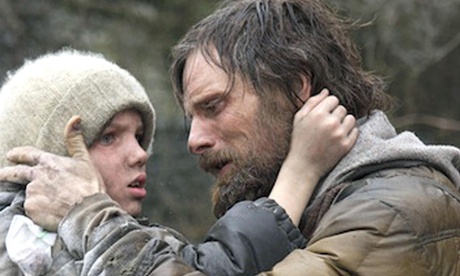
Boy: What would you do if I died?
Man: If you died I would want to die too.
Boy: So you could be with me?
Man: Yes. So I could be with you.
With weeping comes release. I think that, for men, crying is less a response to pain or frustration than a necessary outpouring of suppressed feeling. Men allow themselves to cry only after the fact; tears are an expression not only of the tragic but of having come through tragedy. To weep, then, is life-affirming and spiritually restorative, one might even say that all crying contains within it an element of joy.
I tend to obsess over films I love, watching them over and over and getting to know them intimately. But I have to admit I have only watched The Road once, such were the depths of emotion it evoked on the first viewing.
There are many reasons the film made me cry. The story may be set in a post-apocalyptic world populated by rapists and cannibals, but essentially the film is about fatherhood. In the script, just as in Cormac McCarthy’s book, the generic trappings are used to bring primal parental instincts into sharp relief. The film is every father’s worst nightmare made real and faced down with love and courage and inextinguishable hope.
Early on, we witness the Man pleading with his wife not to take her own life in the face of the futility of existence on a dying planet, desperately trying, and failing, to make her stay. Charlize Theron’s bitter despair and Viggo Mortensen’s heartbreak are hard to watch. Indeed, Mortensen’s performance throughout is incredibly moving. Despite his obvious beauty, he manages – to paraphrase Harrison Ford – to draw one’s attention not to how close he is to the character he is playing, but how close we the audience are to that character.
Music, of course, can have a powerful effect on emotion, and the film’s score, by Nick Cave and Warren Ellis, played me like a fiddle. The delicate piano and spiralling violin conjure a sense of yearning sadness and soothing warmth, like a brother’s hand on one’s shoulder in a time of need.
After a narrow escape, the father attempts to reassure his son, telling him he must “keep carrying the fire”. What begins as a desperate attempt to instil hope and resolve in a scared child gradually becomes real to the Man, an article of true faith. I found this idea infinitely touching and authentic: that out of our imaginations we create myths for ourselves, and that – simply through our belief in them – these myths can become a source of profound spiritual strength.
When the Man can go no further, the separation of father and son is almost unbearable. Grace comes, however, in the form of another man, another father, who takes the Boy into his care. The “fire” – the father’s love for his son – transcends even death, and one man’s faith is sanctified by another’s kindness. I may have spent the entire film with a lump lodged firmly in my throat, tears welling behind my eyes, bottom lip aquiver, but it was only once the Boy was safe that the crying began.

